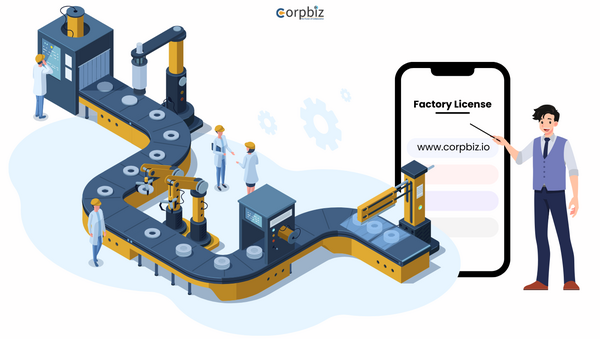Notifications
ALL BUSINESS
COMIDA
DIRECTORIES
ENTERTAINMENT
FINER THINGS
HEALTH
MARKETPLACE
MEMBER's ONLY
MONEY MATTER$
MOTIVATIONAL
NEWS & WEATHER
TECHNOLOGIA
TV NETWORKS
VIDEOS
VOTE USA 2026/2028
INVESTOR RELATIONS
COMING 2026 / 2027
ALL BUSINESS
COMIDA
DIRECTORIES
ENTERTAINMENT
FINER THINGS
HEALTH
MARKETPLACE
MEMBER's ONLY
MONEY MATTER$
MOTIVATIONAL
NEWS & WEATHER
TECHNOLOGIA
TV NETWORKS
VIDEOS
VOTE USA 2026/2028
INVESTOR RELATIONS
COMING 2026 / 2027
About Me
 Manish Kapoor
Manish Kapoor I am a seasoned professional specializing in corporate advisory services. With a strong background in business consulting, I am dedicated to helping businesses navigate regulatory compliances, streamline operations, and achieve their strategic goals.
Posted by - Manish Kapoor -
on - December 9, 2024 -
Filed in - Business -
factory license factory license registration factory license application building noc -
422 Views - 0 Comments - 0 Likes - 0 Reviews

Starting and operating a Micro, Small, and Medium Enterprise (MSME) in India comes with its share of legal and regulatory requirements. Among these, obtaining a factory license is one of the most crucial steps for businesses involved in manufacturing or industrial activities. As entrepreneurs, we must ensure that our business operations comply with legal standards to maintain smooth functioning and build credibility. In this article, we will explore why factory licenses are essential, how to proceed with factory license registration, and the importance of other requirements like building NOC.
Understanding the Importance of a Factory License
A factory license serves as official permission granted by the state government for factories to operate within a specific region. It ensures that we comply with the Factory Act, 1948, which governs health, safety, and welfare measures for workers. This license safeguards not only the workforce but also the business from potential legal complications.
For MSMEs in India, obtaining a factory license is not just a regulatory formality; it is a tool to enhance transparency and credibility. It assures stakeholders, including clients, employees, and regulatory bodies, that we operate responsibly and adhere to safety norms.
The Factory License Registration Process
The process of Factory License registration may seem daunting, but it is an essential step for MSMEs to establish themselves legally. Here’s a simplified breakdown of how we can register for a factory license:
The first step in the factory license application process is determining whether our business falls under the purview of the Factory Act, 1948. Typically, any premises employing 10 or more workers and using power for manufacturing activities or employing 20 or more workers without using power must register for a factory license.
To proceed with factory license registration, we need to gather the following documents:
Once the documents are in order, we need to submit our factory license application to the Chief Inspector of Factories in our state. The application can usually be submitted online through the state government’s portal.
After submission, the concerned authorities may conduct an inspection of the premises to verify compliance with safety, health, and environmental standards. Once satisfied, the authorities grant the factory license.
Factory licenses must be renewed periodically. Ensuring timely renewal helps us avoid penalties and maintain compliance.
Importance of Building NOC in Factory Licensing
A building NOC is a critical component of the factory license application process. It is a document issued by the local municipal authority or fire department certifying that the factory premises meet safety standards. Without this certificate, the factory license registration process cannot proceed.
Obtaining a building NOC requires us to adhere to specific guidelines, such as having proper fire exits, installing fire extinguishers, and ensuring structural stability. This step not only facilitates the factory license application process but also ensures the safety of employees and assets.
Benefits of Obtaining a Factory License for MSMEs
With a factory license, we ensure that our MSME operates in compliance with Indian laws. This reduces the risk of legal penalties and operational disruptions.
Factory license registration requires us to implement safety measures, which foster a secure and healthy work environment for our employees.
Possessing a factory license signals to clients, investors, and other stakeholders that we priorities compliance and ethical practices.
MSMEs with proper licensing can avail of various government schemes and incentives designed to promote industrial growth.
A legally compliant and safe factory environment motivates employees and contributes to increased productivity.
Challenges in Factory License Application and How to Overcome Them
While the process of obtaining a factory license is straightforward, MSMEs may face certain challenges, including complex documentation requirements, delays in approvals, and navigating state-specific rules. To address these issues, we recommend:
Why MSMEs Should Priorities Factory Licensing
For MSMEs, obtaining a factory license is more than a legal necessity; it is a strategic decision to strengthen business operations. The license provides us with a strong foundation to grow sustainably while complying with the laws of the land. Additionally, factory license registration facilitates smoother interactions with government authorities, enhancing our reputation as a reliable and responsible enterprise.
Ignoring this crucial requirement can lead to penalties, operational shutdowns, and reputational damage. Therefore, we must treat factory license application and renewal as ongoing priorities for our MSME.
Conclusion
In conclusion, obtaining a factory license is undeniably essential for MSMEs engaged in manufacturing or industrial activities in India. From ensuring legal compliance and worker safety to boosting credibility and operational efficiency, the benefits of factory license registration are manifold. The process, while involving multiple steps like obtaining a Building NOC and submitting a factory license application, is manageable with the right approach. By prioritizing licensing and compliance, we can set our MSME on a path to sustainable growth and success.
FAQs
Factory licenses are generally valid for one year and must be renewed annually. However, some states offer options for multi-year renewals.
Yes, if the premises employ 10 or more workers (with power) or 20 or more workers (without power), a factory license is mandatory under the Factory Act, 1948.
The timeline for approval varies by state and depends on factors such as the completeness of the factory license application and inspection schedules. Typically, it can take a few weeks to a couple of months.
